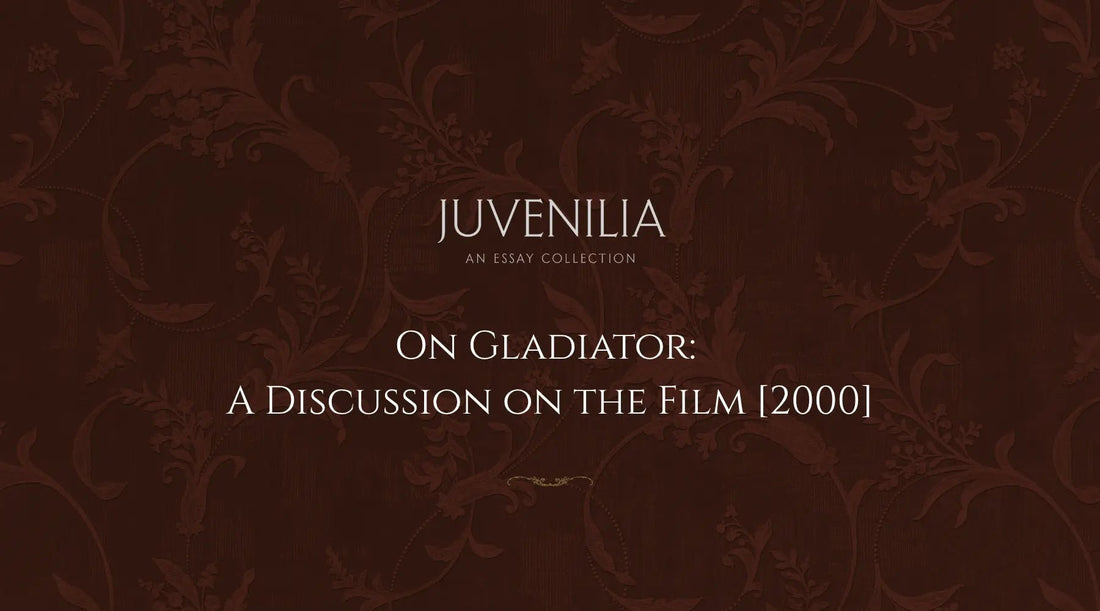
On Gladiator: A Discussion on the Film [2000]
How does the film explore the effects of Roman power and corruption in the personal conflict between Marcus Aurelius and Commodus? In the conflict between Commodus and Maximus?
The film explores Roman power, showing competing levels of authority, pitting different relationships against each other through the frame of the patriarchy in Rome. Examples include: Emperor versus Noble, father versus son, brother versus brother, and equal versus equal. Marcus Aurelius—Commodus shows Commodus always in the weaker position where power is concerned. He is the son, he is far younger, inexperienced, and ill-suited to the role he wishes to inherit. On the hand, we see maximus, is younger, though not inexperienced or ill-suited to the role, and playing the son figure with Marcus as the father. However, they are also equals, man—man, and both wise in their own right. Marcus is everything where Commodus is not, showing what the best of Rome has to offer while also showing the worst.
The film shows how the ‘good’ and moral will suffer following the rules, even if it’s the right thing to do and that as long as they true to their beliefs, no harm can come to them greater than losing one’s self. Maximus has a very difficult life, precisely because he stick to his values, and that is what makes him strong. Commodus, on the other hand, shows how the ‘bad’ or immoral can succeed, precisely because they hold themselves to no personal code. It is this tendency that allows them to rise quick, but it’s a double edged sword because the fall is as fast as the flight. Commodus inevitably takes it too far, and his greatest supporters are the quickest to turn their backs. Maximus does not have this fatal flaw, and instead, we see him make hard, but correct calls, and in the end, it is to him the people flock.
The effects of power are tremendous, and it is precisely for this reason Marcus Aurelius chose Maximus as the next leader of Rome, despite the botched plan. Only those who do not seek power should be given power, and only someone who does not want power for himself should be a leader. This is the concept of the Philosopher King as seen by Plato and Socrates. Maximus declines the offer which is why Marcus Aurelius was sure Maximus was right for the role.
What happens next is ironic. It is for the sole reason that Commodus was un-Roman that he became Emperor of Rome. Personal conflict is in the front seat driving this movie along. We see duty battling desire in this movie, a very prevalent theme in Sword and Sandal genre, but it’s because it’s so compelling. We have a character that does what is right against someone who does what they want.
We all want to do the right thing, but we all also want to achieve our heart’s desires, so despite the shortcomings of Commodus, he is still a compelling character because even if we disagree, we understand. We all want to make our fathers proud, we all want our family to love us, we all want to be loved and whole, we all want to be able to trust those closest to us. To be missing these things is no small matter, so even if Commodus goes about everything all wrong, we understand the drive, and that’s part of what makes the character Commodus so terrifying.
How does the film use the figure of the Gladiator to pose questions of Roman ideals and morality?
The question above sort of goes into this too. By showing the true Roman in the role of the slave (the polar opposite of where he should be), and we see the Roman behaving in the role of highest Roman ideal (also the polar opposite of where he should be), it’s showing flaws of the system where a scenario like this is possible. The very rules undermine the rules, if the rules allow valour to go rewarded with injustice, and injustice to be rewarded with valour, there is something terribly wrong.
The film uses the figure of the gladiator to show the injustice of slavery and the consequences of absolute power, particularly in unfit hands. The character Maximus, at the beginning of the film, is about as Roman as one can be. He is a successful Roman general, and he is seen as the son of Marcus Aurelius, the Roman Emperor. He is stoic, but balanced, and he is moral, intelligent, and compassionate. Commodus, Marcus Aurelius’ true born son, acts as a character foil to juxtapose the excellence of Maximus, showing all the ways Commodus lacks as a leader, but also as a Roman.
They show the difference between good choices and bad choices, success due to birth versus success due to earning it, the importance of caring for one’s family and the unfortunate effects of love falling short. If someone, who so truly fits the mold for ideal Roman, is made to be a slave, how can they justify slavery if it means their ideal can be so easily bought and sold?
Further, the movie gives immense power to Maximus as a gladiator, playing on ‘panem et circenses’ and the imagery and strength one can gain if they answer to the mob, in this case, the masses of Rome, unlike how Commodus approaches it, with strong-arming and manipulation.
What is the film’s final message? Is it a positive or negative view of Roman and/or American culture?
The final message of the film depicts Rome as the enemy, very clearly placing Maximus, or ‘The Spaniard’ in the ‘other’ role—the one to root for. This seems to be commentary on American culture as well, in part because America has based its political system and ideals on Rome, but also because it is made for American audiences and will therefore take creative liberties away from the historical record to make a more relevant point to modern crowds.
The mob has all the power, power that truly takes away from Commodus as we see when Commodus is forced to let Maximus win when the crowd wanted him to live, despite clearing wishing otherwise. Commodus had every intention of manipulating the mob, but instead, the mob manipulated him. This not only gives power to the majority (at least in appearances throughout the film), but it also portrays the slaves as, on a technicality, strong as the emperor himself.
The film is very “power to the people” in its representation. It shows Rome doing terrible things to outsiders, and then shows backstabbing betrayal to one of its own—multiple times—which is trying to garner sympathy from the crowd against Rome. The film is successful in doing this. I’m not sure I can decide on whether the message is positive or negative—as a commentary of the mob being a bad thing and as something destructive to order, or the mob as being a powerful thing in general and stabilizing in nature (though I’m not sure I would say the mob is stable).
Where do you draw the line between achieving what you want and stopping your own perceived happiness? By showing Commodus, not letting anything stop him, and by casting him in the “truly un-Roman” role despite Maximus being “Spaniard”, it’s really showing us that it’s not the birth place that makes someone Roman, or who their father is that makes them Roman; it’s the attitude and belief system one holds and the choices one makes that makes a person Roman.
